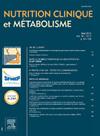The effect of lutein supplementation combined with a low-calorie diet on pro-oxidant/antioxidant balance and serum levels of adiponectin and leptin in the middle-aged obese individuals: A randomized clinical trial
IF 0.4
4区 医学
Q4 ENDOCRINOLOGY & METABOLISM
引用次数: 0
Abstract
Background and objectives
Lutein is a xanthophyll carotenoid with potential advantages for obesity and cardiometabolic disorders. The purpose of this double-blind, randomized, controlled trial was to determine whether consuming lutein alongside a low-calorie diet (LCD) affects the serum levels of leptin and adiponectin and the pro-oxidant/antioxidant balance (PAB) in obese middle-aged individuals.
Material and methods
Following a 2-week run-in phase with an LCD, 48 participants aged 45–65 were randomly assigned to take either 20 mg/d of lutein or placebo in conjunction with an LCD for 10 weeks. At the beginning and end of the study, dietary intake, anthropometric indices, serum levels of leptin and adiponectin and PAB were measured.
Results
The results showed that 10 weeks of lutein supplementation alongside an LCD diet reduced PAB compared to controls (–17.38% in lutein group vs. 21.57% in control group, P < 0.001). No significant changes were observed in the serum levels of adiponectin and leptin.
Conclusion
Lutein consumption could significantly diminish oxidative stress in obese middle-aged individuals.
叶黄素补充结合低热量饮食对中年肥胖者促氧化/抗氧化平衡及血清脂联素和瘦素水平的影响:一项随机临床试验
背景与目的叶黄素是一种叶黄素类胡萝卜素,对肥胖和心脏代谢疾病具有潜在的优势。这项双盲、随机、对照试验的目的是确定在低热量饮食(LCD)的同时摄入叶黄素是否会影响肥胖中年个体的血清瘦素和脂联素水平以及促氧化/抗氧化平衡(PAB)。材料和方法48名年龄在45-65岁之间的参与者被随机分配到服用20毫克/天的叶黄素或安慰剂与LCD联合服用10周。在研究开始和结束时,测量饮食摄入量、人体测量指数、血清瘦素、脂联素和PAB水平。结果结果显示,与对照组相比,添加10周叶黄素并添加LCD饮食可减少PAB(叶黄素组为-17.38%,对照组为21.57%;0.001)。血清脂联素和瘦素水平未见明显变化。结论叶黄素可显著降低中年肥胖人群的氧化应激。
本文章由计算机程序翻译,如有差异,请以英文原文为准。
求助全文
约1分钟内获得全文
求助全文
来源期刊

Nutrition Clinique et Metabolisme
医学-内分泌学与代谢
CiteScore
0.80
自引率
16.70%
发文量
216
审稿时长
78 days
期刊介绍:
Nutrition Clinique et Métabolisme is the journal of the French-speaking Society of Enteral and Parenteral Nutrition. Associating clinicians, biologists, pharmacists, and fundamentalists, the articles presented in the journal concern man and animals, and deal with organs and cells. The goal is a better understanding of the effects of artificial nutrition and human metabolism. Original articles, general reviews, update articles, technical notes and communications are published, as well as editorials and case reports.
 求助内容:
求助内容: 应助结果提醒方式:
应助结果提醒方式:


